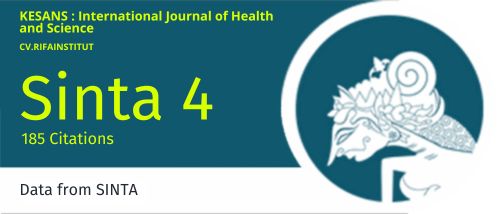Analysis of the Concept of Self-Management in Hypertensive Patients
DOI:
https://doi.org/10.54543/kesans.v4i12.434Keywords:
Antecendence factor, Consequences factor, Hypertension, Self-managementAbstract
Hypertension is a chronic condition that increases the risk of cardiovascular morbidity and mortality. Self-management is an important strategy in controlling hypertension through the integration of health education, behavioral adaptation, social-psychological support, and identification of patient barriers. This study aims to explore the concept of self-management in hypertensive patients through a literature review supported by case observations. This study employs a qualitative method, reviewing 20 articles published between 2024 and 2025 from major bibliographic databases. Data were analyzed thematically to identify patterns of antecedent factors, consequences, and self-management strategies, which were then compared with three real-life cases of hypertensive patients. Results indicate that high health literacy, strong family support, and adaptive lifestyle changes contribute to blood pressure control and improved quality of life. Conversely, resistance to behavioral change, denial of diagnosis, and low self-confidence are associated with uncontrolled hypertension. This study concludes that personalized interventions combining structured education, behavioral motivation, community engagement, and technology utilization can strengthen self-management skills, optimize hypertension control, and reduce the disease burden in the community.
Downloads
Published
How to Cite
Issue
Section
Citation Check
License
Copyright (c) 2025 Galuh Iriantono, Reni Purwandari, Suzanna Amelia, Satriya Pranata, Siti Aisah, Aric Vranada

This work is licensed under a Creative Commons Attribution-ShareAlike 4.0 International License.





















